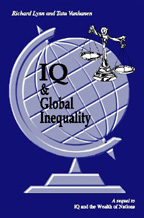IQ and Global Inequality

IQ and Global Inequality cover
|
|
| Author |
Richard Lynn Tatu Vanhanen |
|---|---|
| Language | English |
| Genre | Human intelligence, political science, sociology, economics |
| Publisher | Washington Summit Publishers |
|
Publication date
|
10 November 2006 |
| Media type | Print (hardcover) |
| Pages | 442 |
| ISBN | |
IQ and Global Inequality is a 2006 book by psychologist Richard Lynn and political scientist Tatu Vanhanen.IQ and Global Inequality is follow-up to their 2002 book IQ and the Wealth of Nations, an expansion of the argument that international differences in current economic development are due in part to differences in average national intelligence as indicated by national IQ estimates, and a response to critics. The book was published by the controversial Washington Summit Publishers.
Lynn and Vanhanen's research on national IQs has attracted widespread criticism of the book's scores, methodology, and conclusions. The book was positively received by some long time supporters of Lynn's research, including J. Philippe Rushton.
In IQ and Global Inequality Lynn and Vanhanen argue that intelligence, as measured by IQ tests, is a major contributor to national wealth as well as to various measures of social well-being. They base this argument on the finding that nations' average IQs have a strong correlation with several such factors, among them adult literacy (0.64), tertiary education (0.75), life expectancy (0.77), and democratization (0.57). The book is a follow-up to Lynn and Vanhanen's 2002 book IQ and the Wealth of Nations, and expands on many of the ideas presented in their earlier book.
IQ and Global Inequality responds to some of the criticisms directed against the earlier book. To address the criticism that measures of national IQ are unreliable, for 71 nations they measure national IQs using two different methods, and find that the correlation between different measures of national IQ is 0.95. As a further argument for reliability, they find that their reported national IQs are correlated with various measures of math and science achievement, with correlations ranging from 0.79 to 0.89.
Finally, the book presents the authors' theory as to the cause of national IQs. They propose a model of gene-environment interaction in which high IQ leads to better nutrition, education and health care, further enhancing IQ. They also propose that the racial composition of countries is an important factor in national IQs. They base this conclusion on the observation that national IQs can generally be predicted from the countries' racial composition, and that national IQs of racially similar countries tend to cluster together.
...
Wikipedia
